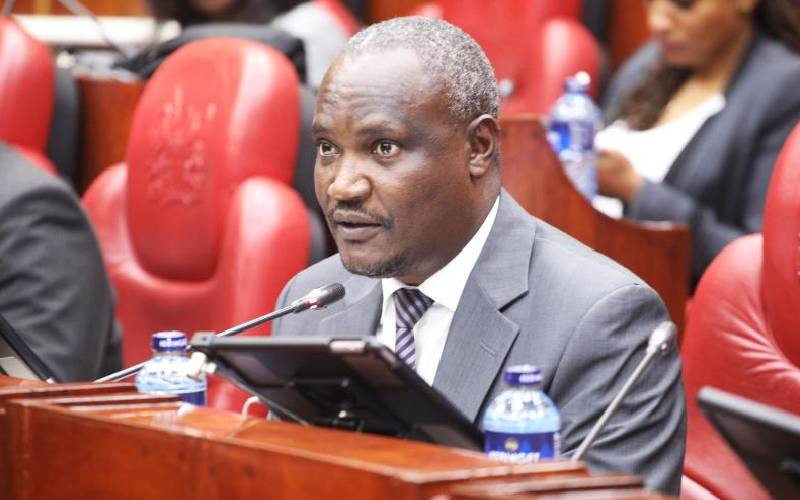The Senate has prohibited Governors and Members of County Assemblies from branding public projects and government vehicles with messages that seek to promote individual identities.
The Senate Devolution and Intergovernmental Relations Committee, in its report, contends that branding public projects and vehicles with individual names or images is the personalisation of public resources, creating the impression of individual ownership.
The Committee, chaired by Wajir Senator Sheikh Abbass, says that such practices by Governors, Members of County Assemblies, and any other public officers are unethical and in contravention of the Constitution, the Public Service (Values and Principles) Act, the Public Officer Ethics Act, and the Leadership and Integrity Act.
“Using public funds to brand projects and vehicles with the names or images of public officers amounts to misuse of public resources and goes against the principles of transparency and prudent financial management as set out in public finance management laws,” says the report.
The Senate Committee emphasises the need to discourage Governors, Members of County Assemblies, and county officials from branding public projects with their personal identities, arguing that proper addressing and naming of county infrastructure needs to be implemented.
The Committee now wants the Ethics and Anti-Corruption Commission (EACC), the Office of the Auditor-General, and the Controller of Budget to enforce strict compliance with constitutional and statutory provisions governing integrity, accountability, and the proper use of public resources.
“These oversight institutions should enhance monitoring, issue clear advisories to public officers on the proper use of public funds, conduct audits and investigations, and take appropriate disciplinary action against misuse of public funds for personal branding,” says the report.
The directive of the Senate Committee follows Laban Omusundi, an activist based in Nakuru, filing a petition at the Senate concerning the matter of branding public projects and county vehicles with images of Governors and Members of County Assemblies.
According to the petitioner, all county-funded projects across all 47 counties are adorned with portraits, images, and names of Governors and Members of County Assemblies, as if the projects were funded by them and not taxpayers.
Omusundi argues that these political elites in the counties have been allowed to massage their political egos and use spaces of publicly funded projects to advertise and brand themselves for personal political purposes without checks and balances.
“Article 231(4) of the Constitution disallows the portrait of any individual on the currency. Why should politicians be allowed to brand taxpayer-funded projects with their respective portraits, images, or names?” said Omusundi.
The petitioner told the Senate that it was high time to reject this self-aggrandisement by using taxpayers’ funds to brand political elites’ portraits, images, or names to perpetuate personal political egos, contrary to Article 75(1) of the Constitution of Kenya.
Omusundi, in his prayers, asked the Senate to initiate an amendment to the County Government Act to insert a clause to restrain Governors and Ward Representatives from branding their respective portraits, images, or names on publicly funded county projects.
“The Senate should consider amending the County Government Act to ensure that all publicly funded projects are branded as ‘Courtesy of Taxpayers of Kenya’ and come up with amendments to any law in existence to make sure all county government vehicles are branded with colours of the national flag to make them easily identifiable,” said Omusundi.
The Committee recommends that public officers, including Governors, Members of County Assemblies, and officials at both national and county levels, should strictly adhere to the laws guiding the conduct of public officers, including the Constitution, the Public Service (Values and Principles) Act, the Public Officer Ethics Act, and the Leadership and Integrity Act.
Stay informed. Subscribe to our newsletter
The Senate Committee also recommends that, when conducting audits, the Office of the Auditor-General should specifically flag any instances of branding on public projects and government vehicles that promote individual identities, with such cases highlighted as potential misuse of public funds for personal gain, and appropriate recommendations made in line with the law.
According to the report, the EACC should, within 30 days upon the tabling of this report, provide a report to the Senate on the status of the interventions and measures taken to restrain public officers from branding public projects, vehicles, or assets with their names, images, or personal symbols.
“All public institutions and project implementers should strictly adhere to the legal and regulatory requirements for displaying information at project and construction sites, including the National Construction Authority Site Board Guide,” says the report.
The Committee further directed that the relevant regulatory agencies, including the National Construction Authority and the county governments, should enhance monitoring and enforcement to ensure compliance with these provisions and prevent unauthorised branding or personalisation of public projects.
The Committee called on counties and state agencies to develop and enforce clear signage guidelines that show projects are publicly funded and owned by the government, and that all signs should display official project information only, without being attributed to individual leaders.
In addition to the prescribed format and positioning of registration plates as provided for under the Traffic Act (Registration Plates) Rules, the Committee recommends that all government-owned vehicles should have their official registration numbers clearly and permanently endorsed on the vehicle body for ease of identification.
“The county governments should ensure strict compliance with all laws and regulations governing the registration, identification, and proper use of government vehicles,” says the report.
Such compliance includes adherence to the provisions of the Traffic Act, the Traffic Act (Registration Plates) Rules, and the National Transport and Safety Authority (NTSA) Act, which require standardised registration plates and prohibit unauthorised modifications or personal branding of government vehicles.
Members of the public who witness government vehicles being used for personal gain, such as unauthorised personal branding and private errands, should promptly report such incidents to the relevant institutions such as the EACC, NTSA, and the Police Service Traffic Department.

























